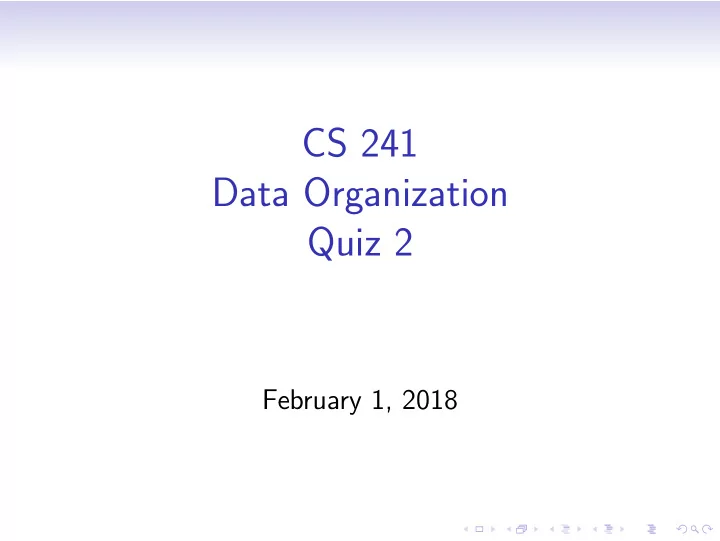

CS 241 Data Organization Quiz 2 February 1, 2018
Question 1: Automatic variable In the C Programming Language, an automatic variable is: A A local variable in a function which comes into existence at the time the function is called, and disappears when the function is exited. B A variable that is automatically initialized. C A global variable that is automatically available to all functions within the source file. D A global variable that is available to all functions within any source file that declare the variable as extern. E A variable that is automatically defined by the compiler such as PI, E, and HBAR.
Question 1: Automatic variable In the C Programming Language, an automatic variable is: A A local variable in a function which comes into existence at the time the function is called, and disappears when the function is exited. B A variable that is automatically initialized. C A global variable that is automatically available to all functions within the source file. D A global variable that is available to all functions within any source file that declare the variable as extern. E A variable that is automatically defined by the compiler such as PI, E, and HBAR.
Question 2: if, else if, else What is the output of this int main(void) code? { int x = 4; A x is 1 if (x == 1) B x is 2 { C x is 3 printf("x is 1\n"); } D x is 4 else if (x == 2) { E Nothing is printed. printf("x is 2\n"); } else x = 3; { printf("x is %d\n", x); } }
Question 2: if, else if, else What is the output of this int main(void) code? { int x = 4; A x is 1 if (x == 1) B x is 2 { C x is 3 printf("x is 1\n"); } D x is 4 else if (x == 2) { E Nothing is printed. printf("x is 2\n"); } else x = 3; { printf("x is %d\n", x); } }
Question 3: Functions This code will not A The version of foo in line compile because: 1 accepts a float, but 1 int foo(float x); returns an int. 2 3 void main(void) B The function foo in line 4 { 1 has no body. 5 int n=5; C The version of foo in line 6 printf("%d\n", foo(n)); 7 } 1 should not end with a 8 semicolon. 9 int foo(int n) D The variable n is declared 10 { in two different places. 11 return 2*n; 12 } E The prototype of foo does not agree with the definition.
Question 3: Functions This code will not A The version of foo in line compile because: 1 accepts a float, but 1 int foo(float x); returns an int. 2 3 void main(void) B The function foo in line 4 { 1 has no body. 5 int n=5; C The version of foo in line 6 printf("%d\n", foo(n)); 7 } 1 should not end with a 8 semicolon. 9 int foo(int n) D The variable n is declared 10 { in two different places. 11 return 2*n; 12 } E The prototype of foo does not agree with the definition.
Recommend
More recommend